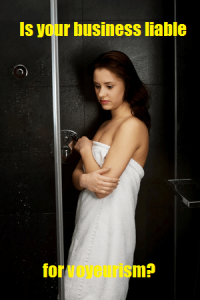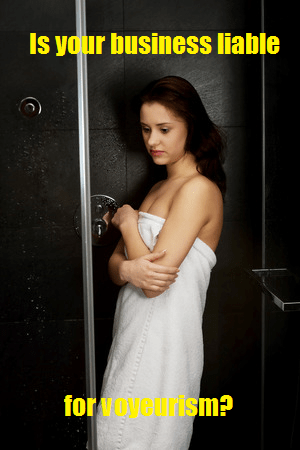 Voyeurism is a problem for business owners today. For example, former Playboy Playmate Dani Mathers took photo(s) of a naked woman showering at an LA Fitness gym and posted to Snapchat to make fun of the woman’s physique.
Voyeurism is a problem for business owners today. For example, former Playboy Playmate Dani Mathers took photo(s) of a naked woman showering at an LA Fitness gym and posted to Snapchat to make fun of the woman’s physique.
The social media backlash against Mathers has resulted in her losing her job, a lifetime ban from the gym, and she may face criminal charges for her conduct and prison time if convicted.
https://www.youtube.com/watch?v=Mww0UP9WSOU
Prison time for digital voyeurism is becoming more common. Earlier this year, Georgetown Orthodox Rabbi Barry Freundel was recently sentenced to more than six years in prison after admitting to video recording 52 women taking nude ritual baths at the synagogue.
But what about your business’ potential liability for voyeurism?
When voyeur videos or photos are taken at a business, there’s always a risk that the victim will sue both the person who recorded the video or took the pictures as well as the business where it occurred. For example, Fox Sports reporter Erin Andrews sued both the stalker who recorded peephole nude videos of her and the hotel owner and operator.
https://www.youtube.com/watch?v=N37GQ1mwjJo
Initially on the hook for $27 million in the subsequent civil suit, the hotel settled the case for $5 million.
What can you do to protect your business from voyeur videos and pics?
Although there’s no complete shield to prevent a lawsuit, your liability exposure can be significantly reduced by taking the following steps.
1. In places where nudity or partial nudity is likely to occur, prominently post signs that prohibit photography and filming. This can include:
- bathrooms;
- changing rooms;
- fitting rooms;
- hotel/motel rooms;
- locker rooms;
- massage rooms;
- public baths;
- showers;
- sauna;
- pools, etc.
If you have escalators and other locations where it is possible for upskirt pics or video to be taken without consent, you may also wish to post signs in these locations too.
2. In areas of your business where voyeurism could occur, have your cleaning staff routinely check for hidden cameras and video recording devices. You may wish to invest in hidden camera detectors to make it easier to discover spy cameras. Any suspicious devices should be reported to you immediately so that your business attorney and law enforcement can handle the matter.
3. Whether it’s a gym membership contract, a check-in agreement at a hotel, or some other written form of agreement you have with a customer, consider having the agreement modified by an experienced contracts lawyer to ban filming and photography in areas where voyeurism could occur on your premises. Your attorney may also want to include related indemnification and defense provisions.

